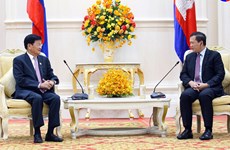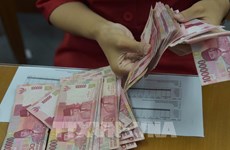Nuclear-free Southeast Asia spotlighted at conference
A conference on maintaining a nuclear-free Southeast Asia took place on
February 12 in Jakarta, Indonesia.
A conference on maintaining a nuclear-free Southeast Asia took place on
February 12 in Jakarta, Indonesia. Methods to strengthen
cooperation between ASEAN and international nuclear-related
organisations to preserve a region without nuclear weapons were
discussed.
The event drew the participation of representatives from the International Atomic Energy Agency (IAEA), the Comprehensive Nuclear-Test-Ban Treaty Organisation (CTBTO), officials of five countries with nuclear capabilities, including the US, Russia, France, China and the UK, and representatives from other countries in various regions.
In ASEAN General Secretary Le Luong Minh’s speech to the conference, he voiced ASEAN member states’ unwavering commitment to realise a nuclear free region, as well as the need to reinvigorate links and synergy between the region’s efforts and the global non-proliferation regime.
He stressed the importance of the effective participation of regional nations in a wide spectrum of international instruments and frameworks on nuclear non-proliferation and nuclear security.
He highlighted the need to strengthen cooperation among nations around the globe, especially among ASEAN member countries, the Southeast Asian Nuclear -Weapon- Free Zone Treaty (SEANWFZ), the IAEA and the CTBTO. He said the global nuclear landscape is getting more complicated and less predictable, and the concerns are not only nuclear warfare but also nuclear terrorism and nuclear safety.
“Nuclear technology has become more accessible and the need to use nuclear technology for development purposes all the more pressing. The current nuclear regime is multi-faceted, multi-dimensional and multi-layered, encompassing numerous global and regional frameworks for non-proliferation, disarmament, peaceful uses of nuclear energy, nuclear safety and nuclear security,” he said.
He pointed out that by signing the SEANWFZ Treaty in December 1995, the ASEAN member states committed to nuclear disarmament and non-proliferation in the region. This commitment was further reaffirmed with the ASEAN Charter, which has as one of its goals, the preservation of Southeast Asia as a zone free of nuclear weapons and free of all other weapons of mass destruction.
Therefore, as States Parties to the non-proliferation of nuclear weapons (NPT) and the SEANWFZ Treaty, ASEAN member states pursue nuclear non-proliferation in the world and in Southeast Asia in particular, he said.
“The SEANWFZ Treaty is the most important regional treaty on non-proliferation in Southeast Asia . It is a strategic instrument for regional peace and security, and a key part of global disarmament and non-proliferation. The IAEA safeguards are featured prominently in various provisions of the Treaty.
“ASEAN is currently working on the revised Plan of Action (PoA) for the 2013-2017 period with a stronger emphasis on action-oriented measures. It is predicted the revised PoA will continue to encourage all States Parties to conclude with IAEA’s additional protocols,” he said.
Minh also maintained that under the SEANWFZ framework, ASEAN and the IAEA should strengthen cooperation and mutual assistance in related issues such as nuclear safety for peaceful nuclear energy programmes, nuclear waste management, and remedial measures.
Speaking at the conference, Foreign Minister of Indonesia Marty Natalegawa said the ASEAN member countries should realise their commitment for nuclear non- proliferation through specific actions in order to establish nuclear free zones not only in Southeast Asia but in the world.
During the conference, representatives from 27 countries, including Vietnam, exchanged their opinions on the political impacts of the popularisation of the CTBT and the significance of the safeguard measures, as well as IAEA’s additional protocols to support the goals of the ASEAN Charter and SEANFWZ.
Participants at the event also discussed issues related to the further development of the close coordination among the IAEA, the CTBTO and ASEAN as well as the ASEAN Secretariat and member countries. They also focused on what ASEAN members should do to strengthen nuclear safety and ensure peace and security in the region.-VNA
The event drew the participation of representatives from the International Atomic Energy Agency (IAEA), the Comprehensive Nuclear-Test-Ban Treaty Organisation (CTBTO), officials of five countries with nuclear capabilities, including the US, Russia, France, China and the UK, and representatives from other countries in various regions.
In ASEAN General Secretary Le Luong Minh’s speech to the conference, he voiced ASEAN member states’ unwavering commitment to realise a nuclear free region, as well as the need to reinvigorate links and synergy between the region’s efforts and the global non-proliferation regime.
He stressed the importance of the effective participation of regional nations in a wide spectrum of international instruments and frameworks on nuclear non-proliferation and nuclear security.
He highlighted the need to strengthen cooperation among nations around the globe, especially among ASEAN member countries, the Southeast Asian Nuclear -Weapon- Free Zone Treaty (SEANWFZ), the IAEA and the CTBTO. He said the global nuclear landscape is getting more complicated and less predictable, and the concerns are not only nuclear warfare but also nuclear terrorism and nuclear safety.
“Nuclear technology has become more accessible and the need to use nuclear technology for development purposes all the more pressing. The current nuclear regime is multi-faceted, multi-dimensional and multi-layered, encompassing numerous global and regional frameworks for non-proliferation, disarmament, peaceful uses of nuclear energy, nuclear safety and nuclear security,” he said.
He pointed out that by signing the SEANWFZ Treaty in December 1995, the ASEAN member states committed to nuclear disarmament and non-proliferation in the region. This commitment was further reaffirmed with the ASEAN Charter, which has as one of its goals, the preservation of Southeast Asia as a zone free of nuclear weapons and free of all other weapons of mass destruction.
Therefore, as States Parties to the non-proliferation of nuclear weapons (NPT) and the SEANWFZ Treaty, ASEAN member states pursue nuclear non-proliferation in the world and in Southeast Asia in particular, he said.
“The SEANWFZ Treaty is the most important regional treaty on non-proliferation in Southeast Asia . It is a strategic instrument for regional peace and security, and a key part of global disarmament and non-proliferation. The IAEA safeguards are featured prominently in various provisions of the Treaty.
“ASEAN is currently working on the revised Plan of Action (PoA) for the 2013-2017 period with a stronger emphasis on action-oriented measures. It is predicted the revised PoA will continue to encourage all States Parties to conclude with IAEA’s additional protocols,” he said.
Minh also maintained that under the SEANWFZ framework, ASEAN and the IAEA should strengthen cooperation and mutual assistance in related issues such as nuclear safety for peaceful nuclear energy programmes, nuclear waste management, and remedial measures.
Speaking at the conference, Foreign Minister of Indonesia Marty Natalegawa said the ASEAN member countries should realise their commitment for nuclear non- proliferation through specific actions in order to establish nuclear free zones not only in Southeast Asia but in the world.
During the conference, representatives from 27 countries, including Vietnam, exchanged their opinions on the political impacts of the popularisation of the CTBT and the significance of the safeguard measures, as well as IAEA’s additional protocols to support the goals of the ASEAN Charter and SEANFWZ.
Participants at the event also discussed issues related to the further development of the close coordination among the IAEA, the CTBTO and ASEAN as well as the ASEAN Secretariat and member countries. They also focused on what ASEAN members should do to strengthen nuclear safety and ensure peace and security in the region.-VNA













